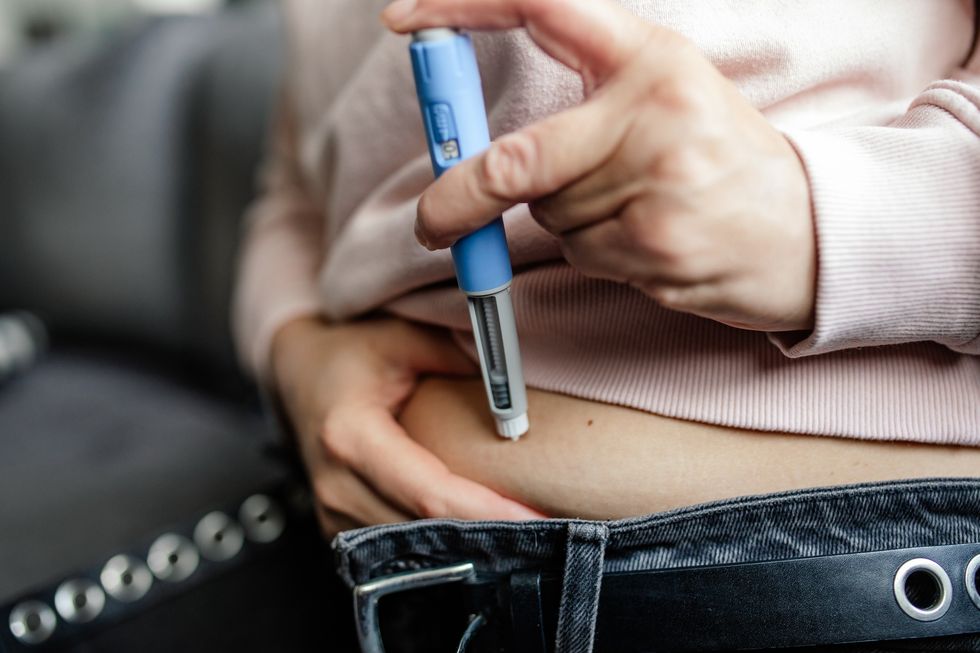Women warned of fat jab 'bone fracture' epidemic as research reveals concerning new risk
One expert told GB News that the widespread use of weight loss drugs could have 'catastrophic consequences'
Don't Miss
Most Read
Women taking popular weight-loss injections could face a five-fold increase in the risk of breaking a hip, according to the drug companies own data.
Dr Paul Mason, an expert in weight loss, told GB News that the widespread use of weight loss drugs could have “catastrophic consequences” at “huge cost to the health system” due to side effects of the drugs, which he believes could include “a tsunami of osteoporosis.”
Dr Mason, a sports medicine doctor who has trained Olympic athletes, cited a study showing patients lost an average of 16.86 kg in 68 weeks on semaglutide (Ozempic), but about 40 per cent of that loss was bone and muscle, not fat, according to the New England Journal of Medicine.
**ARE YOU READING THIS ON OUR APP? DOWNLOAD NOW FOR THE BEST GB NEWS EXPERIENCE**
Regulators have also confirmed that women in another trial had a 500 per cent higher risk of hip fracture after just over a year on the drug.
This figure appears on the Australian drug regulator website, the Therapeutic Goods Administration, and appears to be based on data not available to the public.
Other studies have found the loss of bone and muscle accelerates the longer patients stay on the medication, with a Danish trial finding evidence of escalating bone breakdown throughout a full year of treatment.
A follow-up study showed that within 12 months of stopping Ozempic, patients regained around two-thirds of the weight they had lost - but there was no evidence they regained any lost bone or muscle.
“This leaves people with an impossible choice,” Dr Mason said.
“Stop the drug and regain the fat - or keep taking it and risk further damage to your bones.”
Dr Mason warned that the combined impact of these risks - particularly the bone and muscle loss - could create “a future burden of osteoporosis and fracture-related healthcare costs.”

Women taking popular weight-loss injections could face a five-fold increase in the risk of breaking a hip, according to the drug companies own data
|Getty
The fracture risk comes on top of a growing body of evidence linking weight loss drugs - known as GLP-1 receptor agonists, to a range of other side effects.
These include severe gastrointestinal problems such as nausea, vomiting, diarrhoea and constipation, which can lead to dehydration and hospitalisation in some cases.
There have also been reports of inflammation of the pancreas (pancreatitis), gallbladder problems, and, in rare cases, a potential link to thyroid tumours in animal studies. Some patients have experienced low blood sugar (hypoglycaemia).
Safety agencies have also issued alerts over a small number of reports of suicidal thoughts among users, prompting ongoing investigations in the UK and abroad, there also being several active lawsuits against makers of this class of drugs.
The warning comes as the UK Government announces plans to improve access to the weight loss jabs to tackle soaring obesity rates.
Earlier this week ministers announced a new £85 million partnership with a weight loss drug manufacturer that will allow some high street chemists to offer the drugs to patients on free on the NHS.
Dr Mason says widespread use of the drugs could trigger a wave of health problems, including osteoporosis cases, fractures and long-term disability, adding huge pressure to the health service.
He said: “These drugs could lead to catastrophic costs to the health system in the future. The cost of a broken hip to the health system is huge. This could bankrupt the health system because of a tsunami of osteoporosis which may well come our way.”
Alongside his concerns over the drugs, Dr Mason criticised the Government’s official Eatwell Guide, which recommends about half our calories come from starchy carbohydrates and limits saturated fat to 11 per cent of daily intake.
“There has never been strong evidence to support cutting saturated fat so drastically or eating so many carbs,” he told the GB News.
LATEST DEVELOPMENTS:
“When saturated fat was replaced with seed oils in major trials, there was no health benefit - in some cases, death rates went up.”
He said the real drivers of poor health are industrial seed oils, processed carbohydrates and sugars, especially those containing fructose.
These, he explained, can cause insulin resistance - a condition that disrupts how the body handles blood sugar - and also affect the brain’s reward system, leading to stronger cravings and overeating.
“This isn’t just about willpower,” Dr Mason said. “The wrong diet can make you hungrier.”
He also challenged the science linking red meat to cancer, saying it was based on weak studies and flawed animal experiments, and warned that vegan diets without supplements cannot supply essential vitamin B12, which is needed for life.
Dr Mason believes the quickest way for most people to improve their health is to cut seed oils and sugary foods, then, if needed, reduce refined carbs like bread and pasta.

Dr Paul Mason, an expert in weight loss, told GB News that the widespread use of weight loss drugs could have 'catastrophic consequences'
|GB News
But he added that no diet changes can fully protect people from the bone-wasting side effects of long-term weight-loss drug use.
“These drugs are making billions in profit,” he warned. “But if the side effects keep stacking up, I believe it’s only a matter of time before they’re withdrawn - and by then, we could be dealing a tsunami of long-term damage.”
Zoe Harcombe, an obesity expert and author said: “Having studied obesity for over 20 years I really understand the desperation to lose weight. Unfortunately we have always taken risks to be slim and maybe some people are unaware of all the risks they are taking.”
Approximately 1.5 million in the UK are using weight loss injections, most of whom are paying for them privately.
A spokesman for Novo Nordisk which makes Ozempic said: “Like all medications, side effects can occur and vary from patient to patient. Our GLP-1 products have a long history of use in treating type 2 diabetes (over 19 years) and obesity (almost 10 years), supported by robust clinical data.
"The known risks and benefits of semaglutide medicines are described in the SmPC."
He added that hip fractures were listed as a “rare” side effect of Ozempic and that trial data had not “specifically” examined loss of muscle mass in this drug.
The spokesman said that in a “sub study” of 140 people bone scans were carried out showing patients lost more fat than bone and muscle.
A spokesperson for the UK drug regulator the Medicines and Healthcare products Regulatory Agency said: “Patient safety is our top priority and no medicine would be approved unless it met our expected standards of safety, quality and effectiveness.
“We have robust, safety monitoring and surveillance systems in place for all healthcare products. When a safety issue is confirmed, we always act promptly to inform patients and healthcare professionals and take appropriate steps to mitigate any identified risk.
"On the basis of the current evidence, the benefits of GLP-1 medicines outweigh the potential risks when used for the licensed indications.
"The decision to start, continue or stop treatments should be made jointly by patients and their doctor, based on full consideration of the benefits and risks.
“We strongly encourage patients and healthcare professionals to continue reporting suspected side effects to GLP-1 medicines through our Yellow Card Scheme.”











